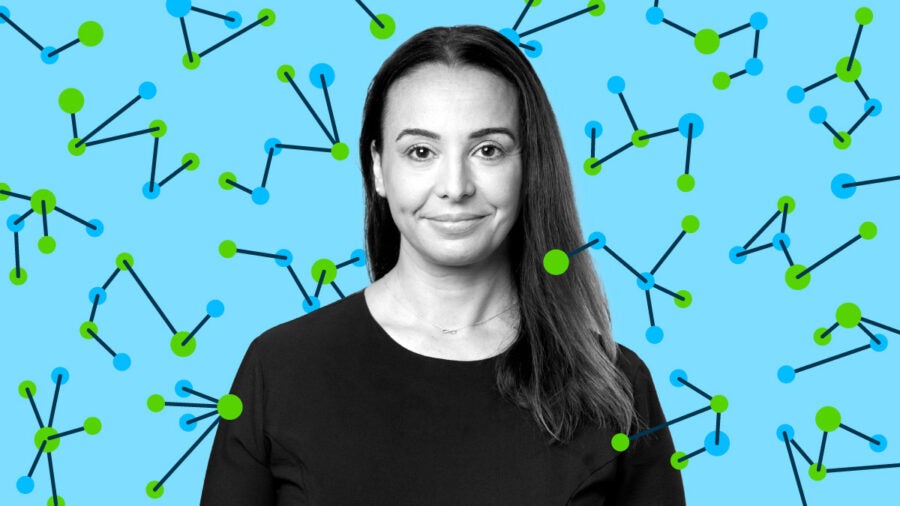
Whenever Patricia Corsi receives a job offer from a potential new employer, she does what she calls “the household check”.
The process entails going through the cupboards in her house to see whether she owns any of that company’s products. That’s because a key factor in her decision to accept or decline a new position is whether the goods made by the firm in question are important to people’s lives.
Corsi has spent most of her career in FMCG with big names including Kraft, Unilever and Heineken, whose products are widely recognised and bought around the world. She switched sectors when pharma giant Bayer came calling in 2019, but the household check was still important. And what she found when she hunted for its products at home was a medicine cupboard featuring Redoxon (Bayer’s vitamin brand), Clarityn (for hay fever) and Bepanthen (for nappy rash).
Patricia Corsi’s CV
Bayer
2022-present: Chief marketing, digital and information officer
2019-22: Global chief marketing and digital officer
Heineken
2016-18: senior vice-president and CMO, Mexico
Unilever
2015-16: UK general manager, foods and beverages
2012-15: Europe vice-president, laundry; global vice-president, homecare
2011-12: senior regional brand development director, laundry, Europe
2006-08: brand director, Latin America
Kraft Foods
2001-05: Group marketing manager
Janssen Pharmaceuticals
1999-2001: trainee and product manager
“This is always my first test when I’m considering a new role,” she says. “I’m looking to see if the brand and company are attractive enough. Then the healthcare sector attracted me from a personal point of view. And I’m always looking for a transformation role, so that was very attractive as well.”
Why Bayer has merged marketing, digital and IT
Corsi’s background is in marketing. She grew up in Brazil with a father and grandfather who worked in the hospitality industry. She was interested in business, but less so in running her own, and chose instead to study advertising just as the discipline was taking off in her country in the 1990s.
Despite not following the entrepreneurial route, she does enjoy “starting something from scratch”. And that has been key to her work at Bayer, where her main focus has been to change not only its approach to marketing but also how people think about the healthcare sector as a whole.
While FMCG is renowned for the creativity of its marketing, pharma is not. This tightly regulated industry tends to focus on communicating the benefits of its products, rather than pushing the creative envelope.
“I know from experience that marketing and brand-building in healthcare was suboptimal. People engage with the issues they have; they rarely engage with the brand,” Corsi says. “At Bayer and across the industry, we were under-utilising point of sale, our channels and the way we communicate. We needed a bit of a revolution.”
The revolution started in marketing but it required a whole business transformation. While Corsi wanted to elevate the function within the organisation, her overriding aim was to move the image of Bayer and the industry more broadly away from doctors in white coats to one that gave people agency to improve their health.
I strive every day to be very good at asking good questions. You don’t need to be a specialist in anything to do that
That meant she needed scope to change the wider business. It’s why Corsi is chief digital officer – and, since last year, chief information officer – as well as CMO.
Having one person acting as CMO, CDO and CIO is unusual in business, mostly because these roles usually require such different skills and expertise. But Corsi believes it makes perfect sense.
“This is a very powerful combination, even if it’s not a very common one, because there are so many commonalities between the commercial area I lead with one part of my job, and then digital and technology and data analytics. It’s like when you add gasoline to a very fast car.”
She admits this makes her role complex, but believes it shines a light on something that is key to leadership: that it’s not about knowing everything yourself but having the right people around you and knowing how to get them doing the right things.
“I strive every day to be very good at asking good questions. You don’t need to be a specialist in anything to do that,” she says. “[Adding IT] does make things complicated, but it’s exciting and it puts me closer to the business. Sometimes if you’re in a chief marketing and digital role that’s global, you can feel a bit detached. When you’re doing end-to-end IT, you’re in the business every day.”
The three stages of Bayer’s transformation
With an understanding of the broader transformation required, Corsi had three key stages in her bid to change the business. The first was to establish a clear idea of what good would look like in this move to shift perceptions, so they would know when the work had improved.

The second step was to consider the skills and capabilities of the team and what was required going forward. This meant bringing in new people and upskilling, or “putting gasoline”, on talent already in the business that wasn’t being used effectively.
Third was building cross-industry partnerships that could push the business forward. Corsi describes how when she arrived the company had relationships that were transactional rather than strategic but it now has four “carefully chosen” partners.
“We have a very different way of managing the relationship. It’s extremely open, we have back-and-forth feedback and it’s fast. If something is going well we’ll double down, if something is going badly our Whatsapp explodes and we try to understand what’s going on and iterate. We are always one call away.”
Corsi was just a year into the role when Covid hit. It was a big shock for the business, which like many others had to find ways to work amid lockdowns and a huge increase in demand for some of its products. But Corsi also saw it as an opportunity to turbocharge its transformation. “Covid meant that suddenly health, which nobody wanted to talk about, was the only thing anyone was talking about,” she recalls.
With that in mind, six months into the pandemic Corsi set up Bayer’s first global creative council. She saw an opportunity to take the changes she was making at Bayer and bring them to the wider industry. The council includes Bayer’s own marketing team and leaders from its creative agencies, but also other businesses in the space, such as Danone and Progressive Insurance, keen to solve the challenge of how to make people more proactive in caring for their own health and bring creativity to the industry’s communication.
How to keep a business transformation on track
Corsi acknowledges that transformation is never done, but four years after joining there are areas where she believes the business has moved to be best-in-class and others where it still has work to do. In marketing, for example, when benchmarked against the competition she believes the business is leading whereas in sales it is “moving from being behind to being at parity”.
Beyond benchmarking, Corsi and the business monitor the success of the transformation using financial, rather than marketing, goals. This means every investment has a business case attached and KPIs that are measurable and ladder up to its strategic goals.
In the end, the transformation is about growing the business amid increased consumer interest but mounting competition post-Covid. In its 2022 results, the company’s group sales were up 8.7% to €50.7bn (£43.5bn). Sales in consumer healthcare were up 8.4%, which the company highlighted as significant given inflation costs.
We have to start looking at health as a holistic treatment, to empower people to take care of their health
Beyond direct financial measures, Bayer also tracks the internal impact of the transformation in terms of metrics such as its ability to attract and retain talent, how engaged they are with the business, and how they perceive it as a place to work.
“When you’re doing a transformation it’s very easy to disengage people,” she highlights. “We want to keep up engagement levels so that when we are making changes in the organisation and to ways of working, we have buy-in.”
Going forward, Corsi wants to build on the work it has done to push the creative envelope and transform how people look after their health. She speaks of the taboos that still exist and the issues that people are still not comfortable talking about, such as women’s intimate health, as well as the need to bring healthcare to more people through digital and virtual services.
“We have to start looking at health as a holistic treatment, to empower people to take care of their health,” she says. “If you have access to money or great health insurance or you live in a country where healthcare is accessible – that is empowering. But if you’re in a country without health insurance or a job where missing a day of work means not getting paid, how do we empower those people?”
For Corsi the job is bigger than marketing and bigger than Bayer. It’s about, as a society, how we can widen access to healthcare, whether through breaking down taboos or offering new ways of accessing doctors and treatments. You get the feeling she’s only just getting started.

Whenever Patricia Corsi receives a job offer from a potential new employer, she does what she calls “the household check”.
The process entails going through the cupboards in her house to see whether she owns any of that company’s products. That’s because a key factor in her decision to accept or decline a new position is whether the goods made by the firm in question are important to people’s lives.
Corsi has spent most of her career in FMCG with big names including Kraft, Unilever and Heineken, whose products are widely recognised and bought around the world. She switched sectors when pharma giant Bayer came calling in 2019, but the household check was still important. And what she found when she hunted for its products at home was a medicine cupboard featuring Redoxon (Bayer’s vitamin brand), Clarityn (for hay fever) and Bepanthen (for nappy rash).
